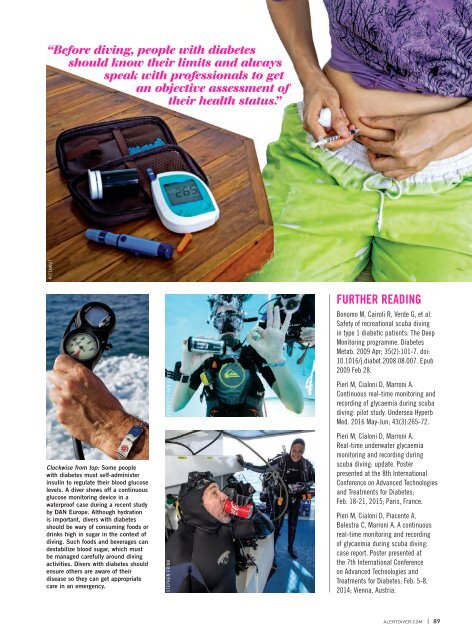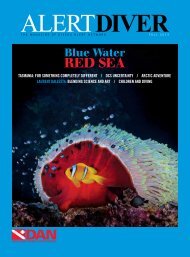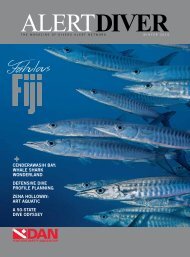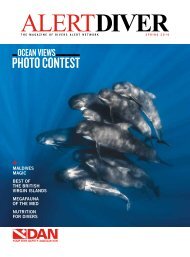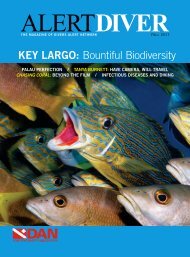AD 2018 Q1
Alert Diver is the dive industry’s leading publication. Featuring DAN’s core content of dive safety, research, education and medical information, each issue is a must-read reference, archived and shared by passionate scuba enthusiasts. In addition, Alert Diver showcases fascinating dive destinations and marine environmental topics through images from the world’s greatest underwater photographers and stories from the most experienced and eloquent dive journalists in the business.
Alert Diver is the dive industry’s leading publication. Featuring DAN’s core content of dive safety, research, education and medical information, each issue is a must-read reference, archived and shared by passionate scuba enthusiasts. In addition, Alert Diver showcases fascinating dive destinations and marine environmental topics through images from the world’s greatest underwater photographers and stories from the most experienced and eloquent dive journalists in the business.
You also want an ePaper? Increase the reach of your titles
YUMPU automatically turns print PDFs into web optimized ePapers that Google loves.
“Before diving, people with diabetes<br />
should know their limits and always<br />
speak with professionals to get<br />
an objective assessment of<br />
their health status.”<br />
PITTAWUT<br />
STEPHEN FRINK<br />
Clockwise from top: Some people<br />
with diabetes must self-administer<br />
insulin to regulate their blood glucose<br />
levels. A diver shows off a continuous<br />
glucose monitoring device in a<br />
waterproof case during a recent study<br />
by DAN Europe. Although hydration<br />
is important, divers with diabetes<br />
should be wary of consuming foods or<br />
drinks high in sugar in the context of<br />
diving. Such foods and beverages can<br />
destabilize blood sugar, which must<br />
be managed carefully around diving<br />
activities. Divers with diabetes should<br />
ensure others are aware of their<br />
disease so they can get appropriate<br />
care in an emergency.<br />
COURTESY DAN EUROPE<br />
STEPHEN FRINK<br />
FURTHER RE<strong>AD</strong>ING<br />
Bonomo M, Cairoli R, Verde G, et al.<br />
Safety of recreational scuba diving<br />
in type 1 diabetic patients: The Deep<br />
Monitoring programme. Diabetes<br />
Metab. 2009 Apr; 35(2):101-7. doi:<br />
10.1016/j.diabet.2008.08.007. Epub<br />
2009 Feb 28.<br />
Pieri M, Cialoni D, Marroni A.<br />
Continuous real-time monitoring and<br />
recording of glycaemia during scuba<br />
diving: pilot study. Undersea Hyperb<br />
Med. 2016 May-Jun; 43(3):265-72.<br />
Pieri M, Cialoni D, Marroni A.<br />
Real-time underwater glycaemia<br />
monitoring and recording during<br />
scuba diving: update. Poster<br />
presented at the 8th International<br />
Conference on Advanced Technologies<br />
and Treatments for Diabetes;<br />
Feb. 18-21, 2015; Paris, France.<br />
Pieri M, Cialoni D, Piacente A,<br />
Balestra C, Marroni A. A continuous<br />
real-time monitoring and recording<br />
of glycaemia during scuba diving:<br />
case report. Poster presented at<br />
the 7th International Conference<br />
on Advanced Technologies and<br />
Treatments for Diabetes; Feb. 5-8,<br />
2014; Vienna, Austria.<br />
ALERTDIVER.COM | 89


